What makes Eastern Adriatic/Herzegovina region-grown, Sage herb/essential oil profoundly special?
During the domestic research work on the realization of the project of introduction of Immortelle seedlings into the organic production, it was shown that the area of the town Ljubinje, i.e. Herzegovina region, has better climatic and pedological (soil) conditions for growing not just Immortelle, but numerous other herbal, and plant species, as well, which results in their prominent therapeutic/healing characteristics, than Europe’s/French well-known regions of Provence, and Corsica.
The “exclusivity” of the two lastly mentioned French regions, in this context, is nothing more than a decades-long/well-financed, branded myth.
Herzegovina region, a worldwide heritage of more than 700 medicinal herbs and plants, many of which are endemic, specific/unique climatic, and soil characteristics, represents the mix of a warm Mediterranean, and cold Alpine mountains atmospheric conditions, followed by the rocky soil, rich in limestone.
It is exactly these, upper stated, Nature itself-given aspects, that are resulting in the inimitable chemotype structure of Sage, and other essential oils, made from the herbs and plants, collected within the Herzegovina region borders.
Pay close attention to what you are purchasing, and using, that markets as a “essential oil”, futhermore, and esspecially, as a “therapeutic-grade”, “food-grade”, “pure”, “local”, and similar!
It is not uncommon, and not a big secret, as a matter of fact, that many essential oil manufacturers, and retailers, are using shady/dishonest practices while distiling, and/or distributing their products.
These include, among other:
- Completion of the distilation process within the period of time that is too short, and using temperatures/pressure that are/is too high/strong, at the same time, in order for the essential oil extraction process to pass properly/smoothly, and to result in a final extract/essence that possesses all of the therapeutic/healing components of the herbal/plant raw material, in a concentrated form (this is a common, shady practice, with the industrially-made products)
- Diluting the concentrate (essential oil/s), with natural and/or synthetic matter (for example, with using the following: Almond oil, fragrance chemicals, etc.)
- Diluting the concentrate (essential oil/s), with other essential oil/s, which possess similar aroma, and are, usually, incomparably cheaper than the original concentrate being diluted; (classical example here is Melissa essential oil – it is often times diluted with citrus essential oils, whose smell resembles Lemon balm)
- Subterfuge of synthetic/fragrance substances, marketed as “natural” “essential oils”
- Deception regarding the location where the essential oil was distilled (for example, the Lemon/Orange/Melissa essential oils, marketed as “Mediterranean”, are, actually, made in India, China, etc.)
- Increasing the amount of certain beneficial/valued compounds within the essential oils, explained within the following example/s – the levels of neryl acetate, a valued/healing compound within the Helichrusym Italicum, is being increased by some distributors, through citrus fruits derived one, and/or it’s levels are being increased by mixing the two, different manufacturers produced, Helichrysum essential oils (one possessing lower levels of neryl acetate, and the other one higher levels of this compound).
Eastern Adriatic Salvia Officinalis Healing Essential Oil
The healing properties of sage were recognized by the ancient Slavics, Chinese, Romans, and Greeks. A well-known Roman proverb says: “If death threatens, go for sage in the garden”.
Sage originates from the Mediterranean area, where it is still mostly collected and cultivated. A highly valued plant among ancient cultures. The Latin name of the entire genus Salvia comes from the Latin term “salvare”, which means “saving, to save, to cure”.
The Chinese idolized Sage, believing it to cure infertility. Ancient Romans called this herb “herba sacra” – “sacred herb”, considering it as being a panacea. Widely associated with wisdom and the ability to give longevity, the herb has remained a very popular healing remedy for many centuries. In the Middle Ages, Sage was included in many tonic drinks, while its leaves were used to disinfect gums and whiten teeth. Before the importation of tea from India and China, Sage tea was widely enjoyed in England.
Today, Salvia officinalis originating from the Adriatic coast is most valued in the world, as it possesses the chemotype of exceptional medicinal value.
Modern science has proven that sage has antibacterial and antifungal effects. It calms, refreshes and invigorates, helps against pain and high fever, can lower the level of glucose in the blood, which makes it useful for diabetes. Sage has recently been shown to improve memory and fight Alzheimer’s.
With bronchitis, sinusitis and influenza, it is indispensable in the aroma lamp. Powerful immune stimulant. Fights throat infections and dental abscesses.
Sage oil is also known for beautifying the skin, as well as a natural sebum regulator, and can be applied equally to mature and young skin, due to its ability of balancing effect on both skin types.
Health Benefits, Uses:
Psycho-emotional action:
- In very small doses, it can have a calming effect on the psyche/parasympathetic nervous system. It is used in a state of fatigue, depression. Sharpens sensory perception, stimulates/improves memory and cognitive performances
- Emotionally and energetically, Sage oil has a cooling and draining energy, helping to relax the mind, soothe anxiety and depression, and induce feelings of calm and composure
- The smoke of White Sage (Salvia apiana) is traditionally used in Native American culture for ceremonial cleansing; similarly, you can spray the essential oil of Salvia officinalis to energetically clean the space you are in. A drop rubbed between the hands quickly disinfects and purifies the energy
Healing action:
- Immune system: It has a general strengthening effect on the body, enhances the body’s defenses. Eliminates the enlargement of the lymph nodes, stimulating the lymph flow, normalizes the functioning of the endocrine glands
- Circulatory system: Due to the cleansing effect within the circulatory system, it raises low blood pressure. Enhances microcirculation, promotes gradual recovery of body functions after strokes
- Digestive system: Clears the palate, pharynx and stomach from mucus. Helps with ulcers in oral cavity, gingivitis, inflammation of the oral mucosa and gums, periodontal disease, caries, pulpitis. Stimulates digestion, recommended for loss of appetite. Provides relief from constipation. Stimulates urination, is a tonic for the liver and kidneys. The oil is good for fluid retention and swelling
- Respiratory system: It has an expectorant and mucolytic effect. Antitussive properties of Sage will be useful for asthma, bronchitis, cough. It is used for tonsillitis, sore throat, tonsillitis, laryngitis. Contributes to the rapid restoration of the voice (very valuable for announcers, lecturers, singers). It has an anti-inflammatory, softening effect in chronic and acute inflammation of the respiratory system
- Reproductive system: It has a significant effect on the female reproductive system. Possesses the characteristics similar to estrogen, regulates the menstrual cycle. Useful for absent, delayed, scanty menstruation, menstrual cramps, menopausal problems. The antiviral effect of sage can be used to treat genital herpes, thrush, and viral enteritis. It has a reputation as an effective remedy for infertility, it can promote conception
- Skin system: Useful for the treatment of eczema and psoriasis. Sage oil stops bleeding from cuts and other skin injuries, stimulates the formation of a new tissue
- Musculoskeletal system: Recommended for the treatment of rheumatism and arthritis. Reduces pain in overworked or injured limbs. Helps with muscle inflammation, and torticollis (neck stiffness). Reduces trembling, including paralytic trembling
- It has a significant antimicrobial effect on bacteria that cause dental diseases
- Has antimicrobial activity against Staphylococcus aureus, Escherichia coli, Shigella sonnei, Klebsiella ozanae, Bacillus subtilis, Candida albicans, Cryptococcus neoformans, and various Salmonella species
Cosmetic action:
- Regenerating properties
- Sage essential oil is used for oily skin care. Balances the production of sebum. Used for pore enlargement. Recommended for acne treatment
- Prevents hair loss and baldness, accelerates growth, restores hair strength, tone, shine and elasticity. Reduces greasiness of hair, relieves dandruff. Reduces alopecia
- Effective against cellulite
- Regulates sweating, used for excessive sweating of the feet and hands
- Sage oil stops blood from cuts and other skin injuries, stimulates the formation of a new skin tissue
- Used for pore enlargement. May improve skin condition with ulcers, dermatitis, psoriasis.
- It is used to relieve inflammation in acne, skin impurities. It reduces the secretion of sebaceous glands, therefore it successfully enhances the final effect of natural products for oily skin of the face, body and head
Botanical Name: Salvia officinalis
Extraction Method: Steam distilled
Part of Plant Distilled: Leaves
Country of Origin: Bosnia and Herzegovina
Composition: 100% Salvia officinalis
Consistency: Thick
Cultivation Method: Organic
Scent Description: Warmly fresh, strong herbaceous camphor, with fresh leaves and sweetness aroma
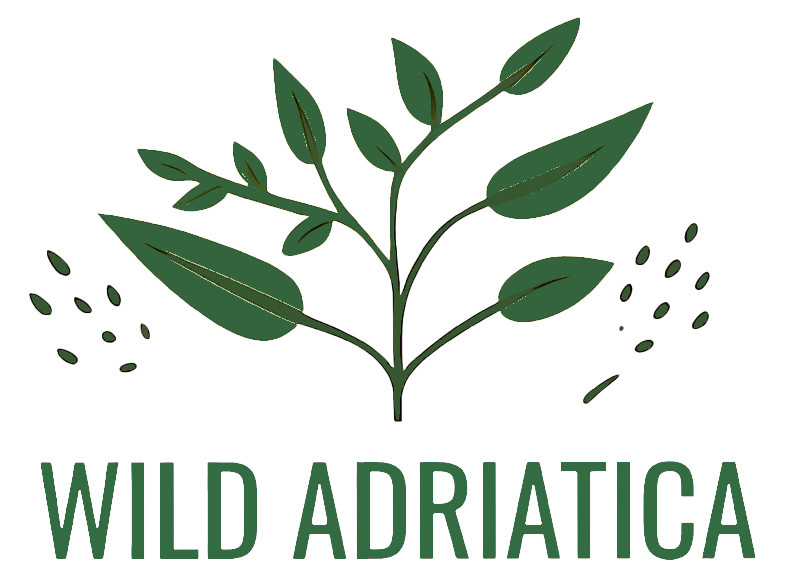
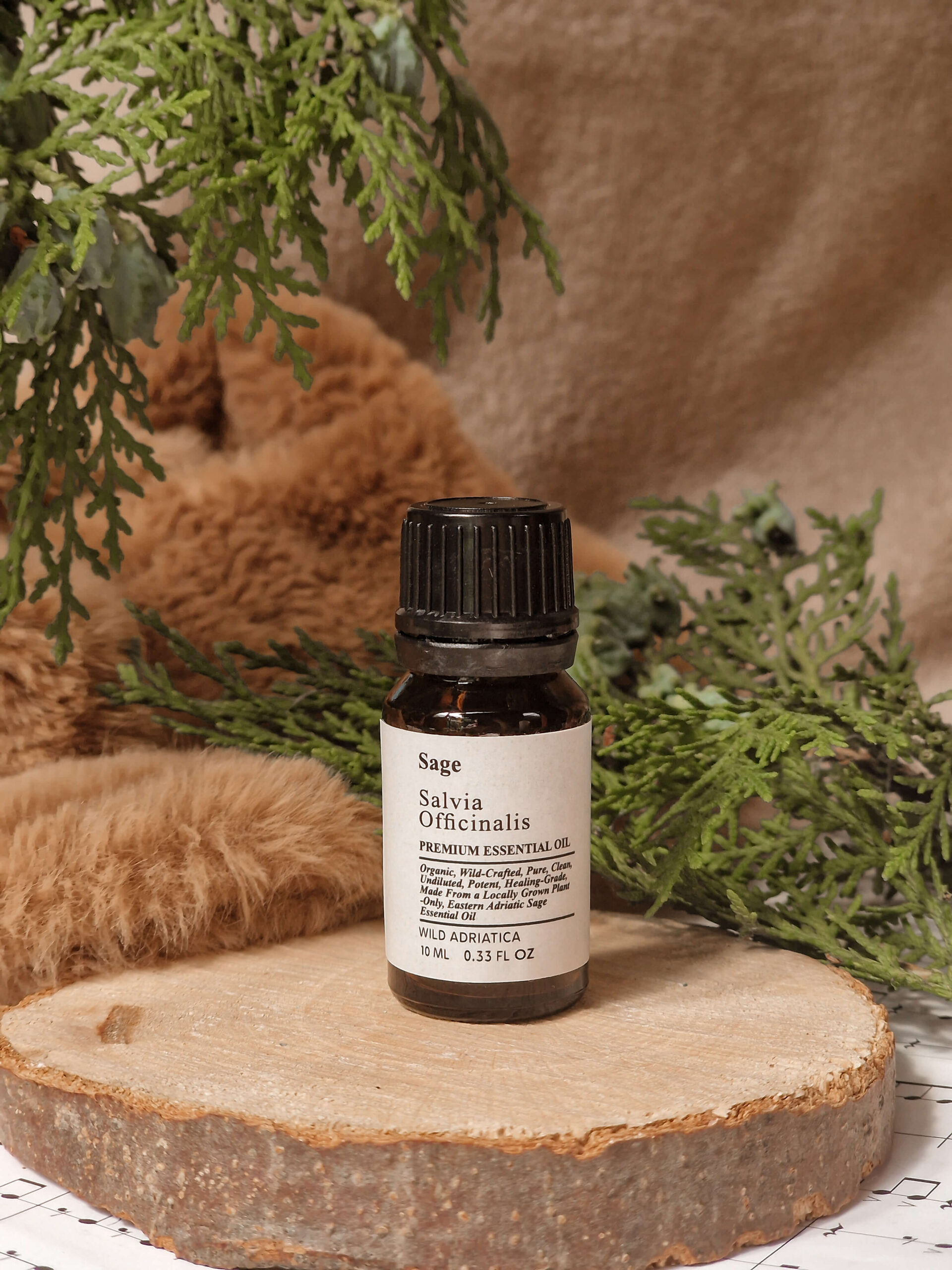
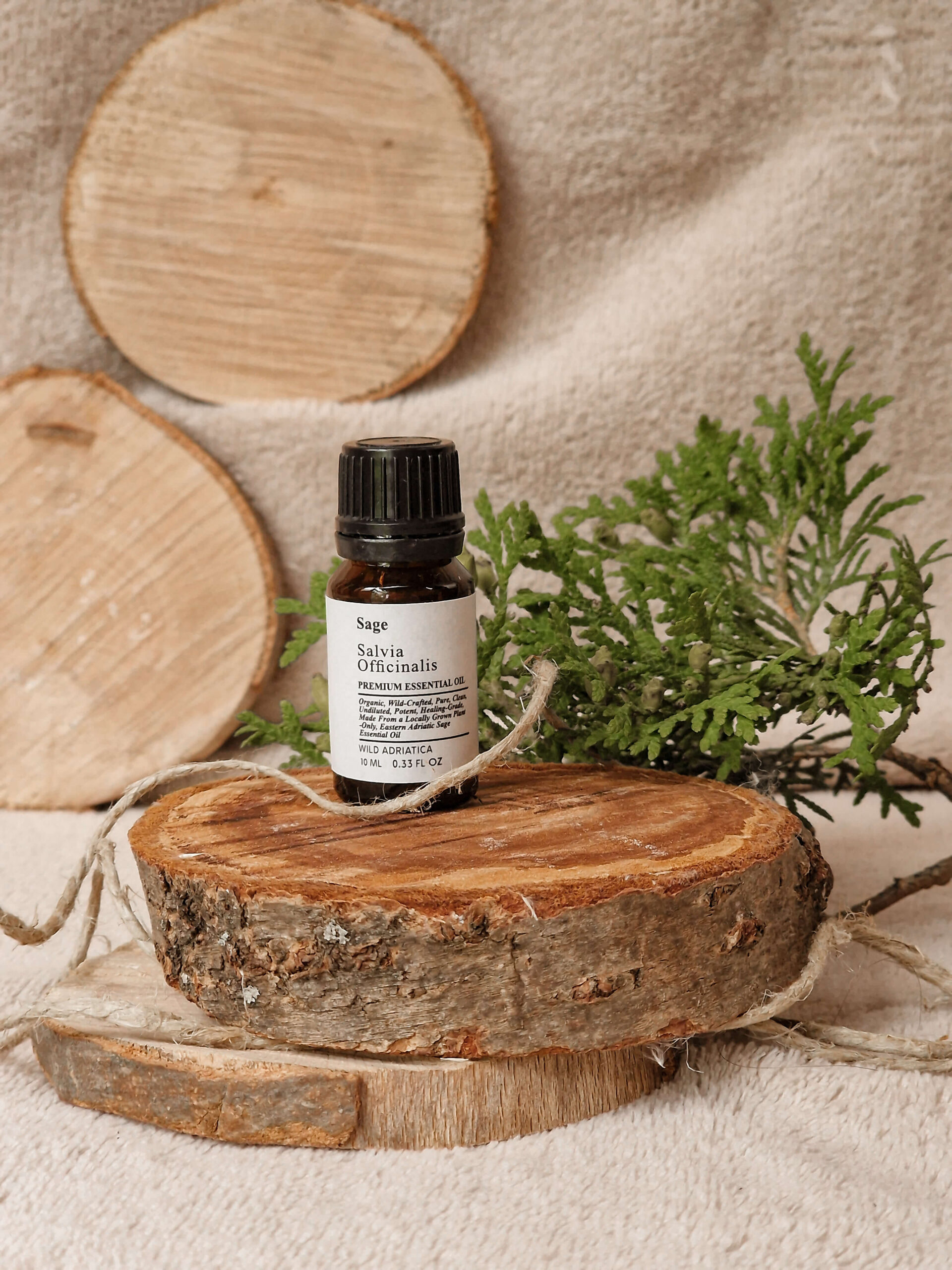
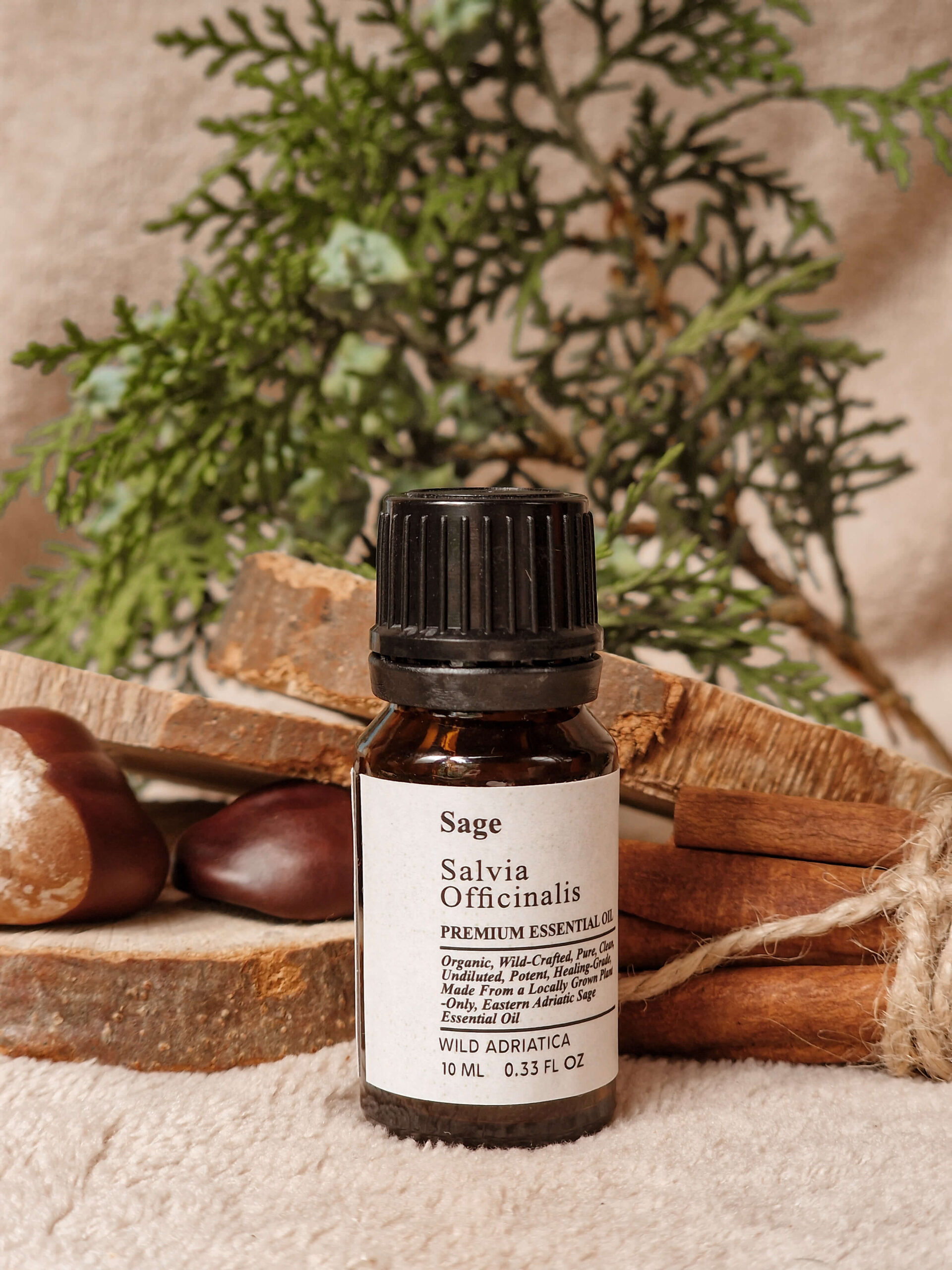
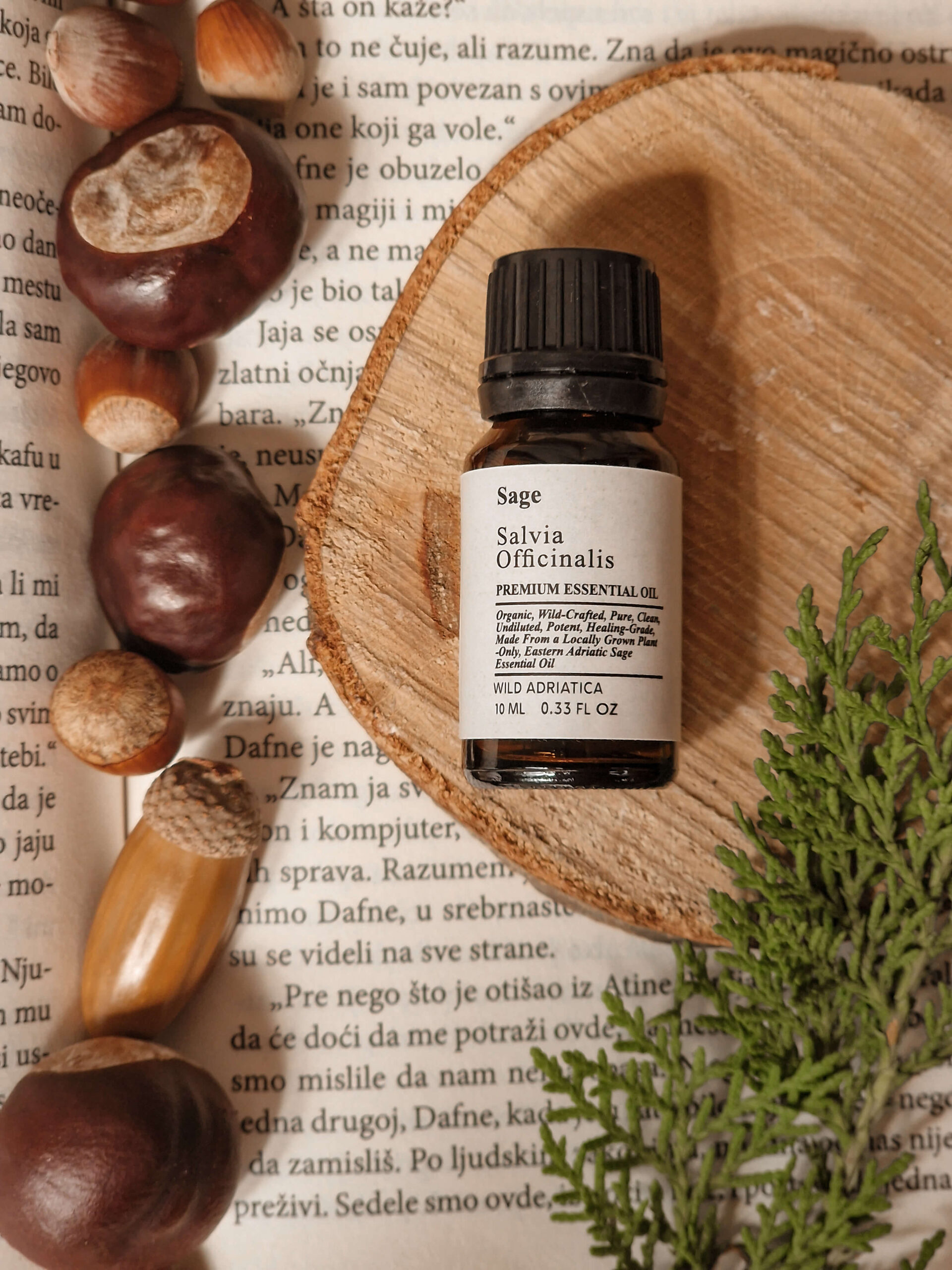
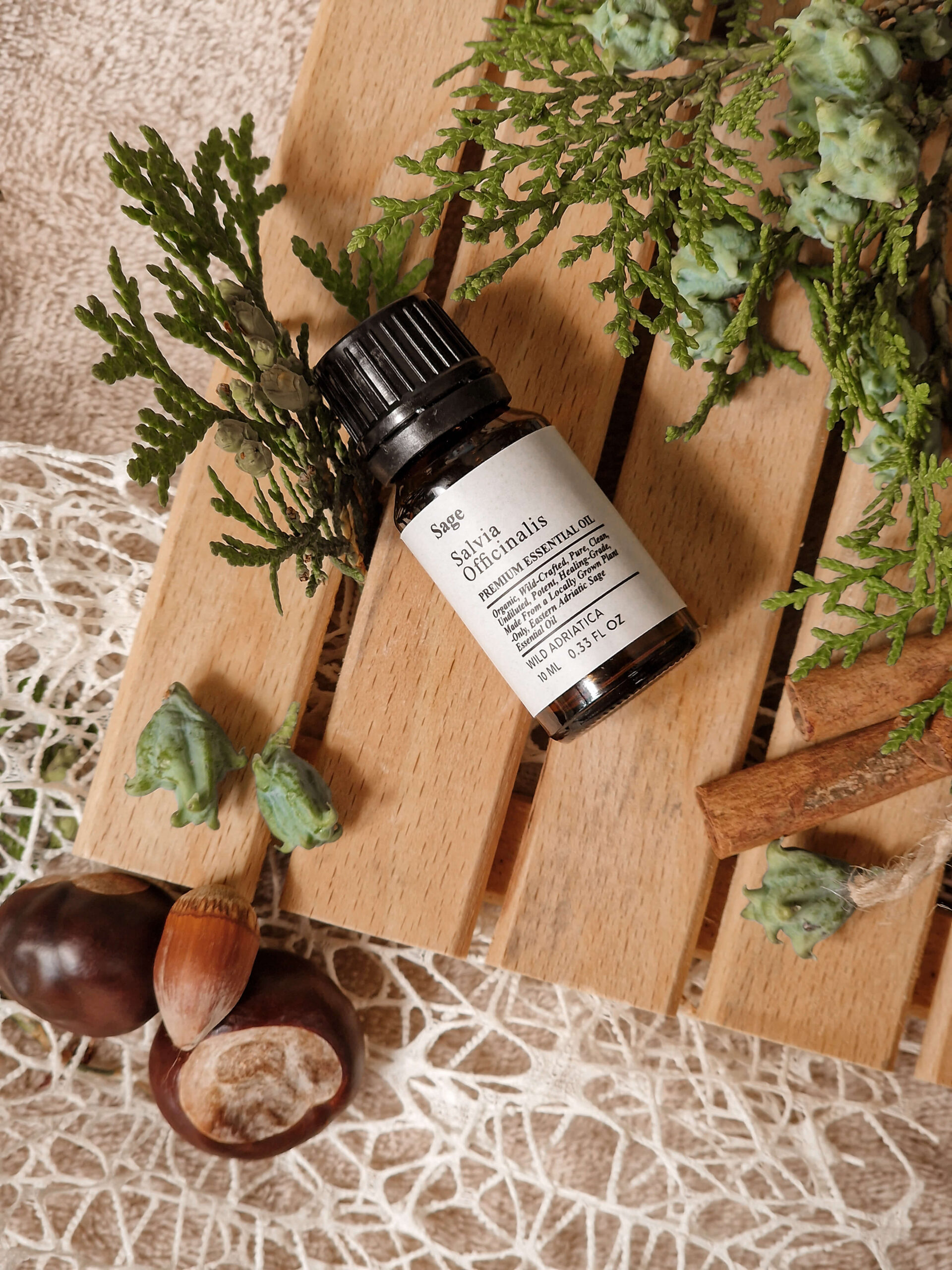
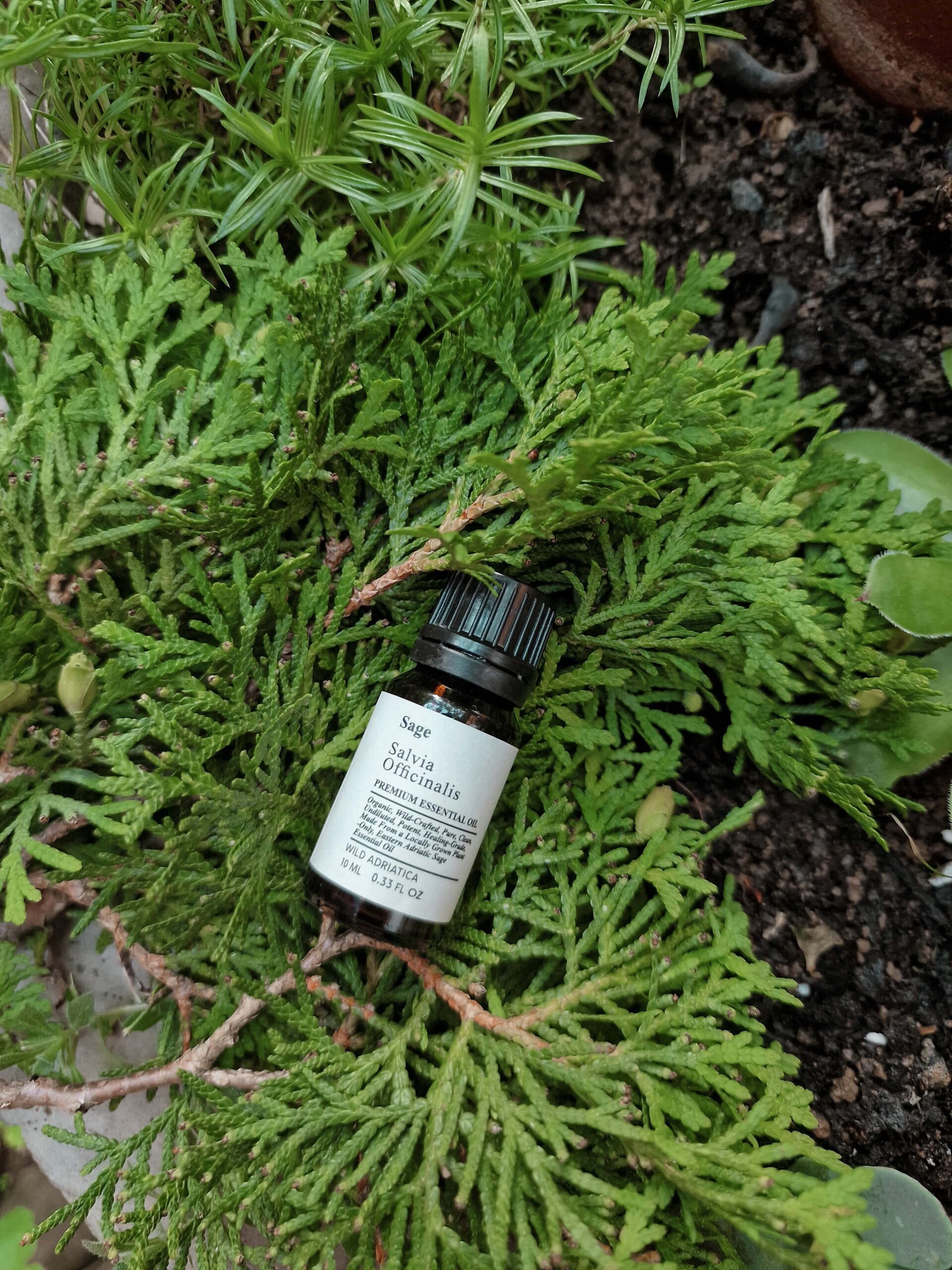
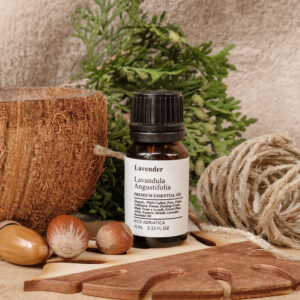
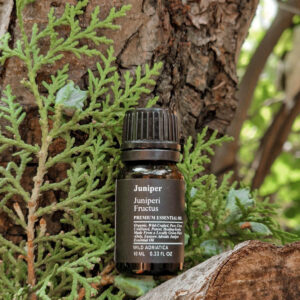
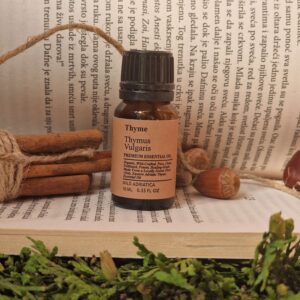
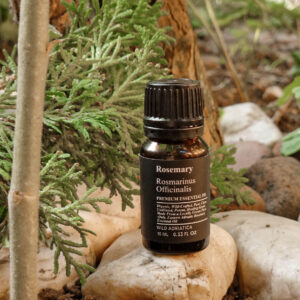
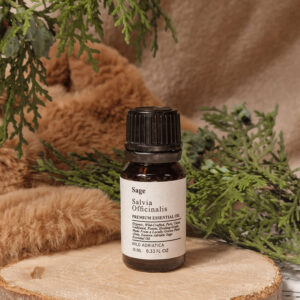
Reviews
There are no reviews yet.